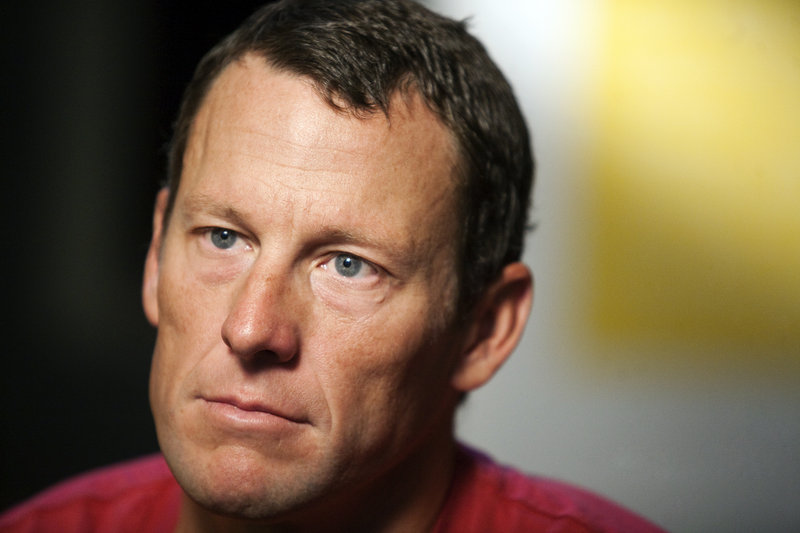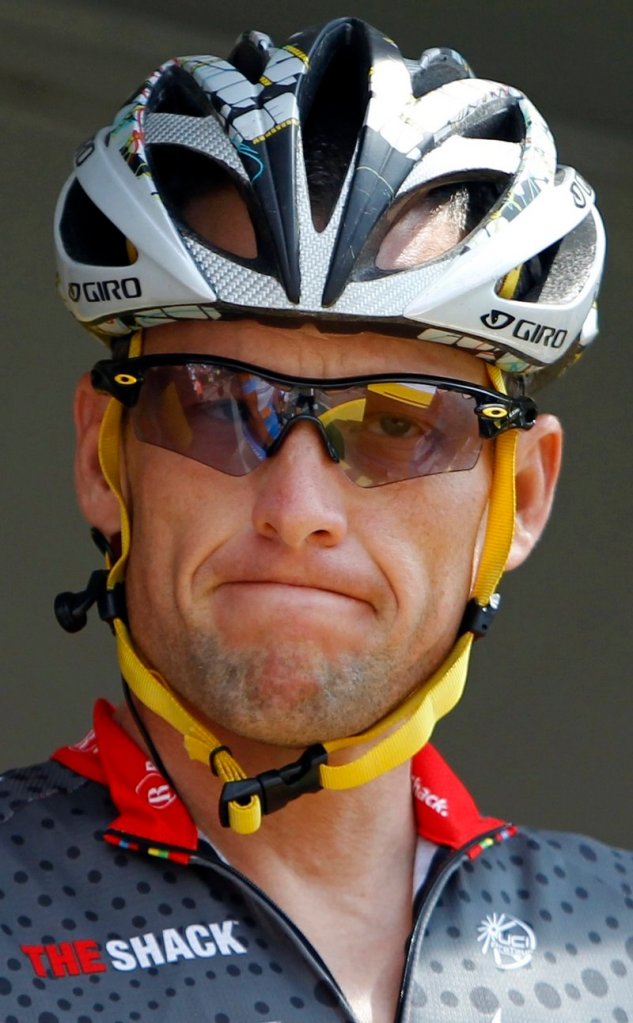For years, Lance Armstrong, cyclist, philanthropist and celebrity, has vowed to persevere through anything. “Pain is temporary,” he wrote in his 2001 autobiography. “It may last a minute, or an hour, or a day, or a year, but eventually it will subside and something else will take its place. If I quit, however, it lasts forever.”
Rather than continuing to defend himself and his unparalleled accomplishments, Armstrong did what few saw coming: He quit his battle against damning allegations from the U.S. Anti-Doping Agency, casting doubt on his stellar career and uncertainty on his professional future.
The USADA announced Friday it was banning Armstrong for life and stripping him of his record seven Tour de France titles, saying the cyclist’s decision not to take the charges against him to arbitration triggers the forfeiture of his Tour victories from 1999 to 2005.
The International Cycling Union, which has been fighting with the USADA over jurisdiction in the Armstrong matter, asked the USADA to present its case. The Amaury Sport Organization, which runs the Tour de France, declined comment until a hearing with the cycling organization and USADA takes place.
Armstrong can still hold out hope that he’ll ultimately be able to retain his Tour titles, as race organizers and the international cycling body wrestle with the USADA over who has the authority to strip the cyclist of the wins. “They don’t unilaterally have the authority because they didn’t award them,” Armstrong’s attorney, Robert Luskin, said of the USADA.
In an interview Friday, Luskin reiterated that the cyclist’s decision Thursday to bow out of the fight against the USADA is not an admission of guilt to any doping charges.
Allegations have become so frequent over the years that Luskin likened it to “an endless game of whack-a-mole.”
“Every time he bangs one over the head, another pops up,” Luskin said. “He just doesn’t see it ending.”
USADA’s chief executive, Travis Tygart, has led the pursuit of Armstrong, charging the cyclist with blood doping and steroid use as far back as 1999. He said the Armstrong case serves as a lesson to competitors.
“Nobody wins when an athlete decides to cheat with dangerous performance enhancing drugs, but clean athletes at every level expect those of us here on their behalf, to pursue the truth to ensure the win-at-all-cost culture does not permanently overtake fair, honest competition,” Tygart said in a statement.
Luskin said between appeals and arbitration, the battle likely would have lasted well beyond 2016 and could have cost Armstrong millions of dollars in the process.
“I think Lance ultimately decided he’d rather be eaten alive by zombies than locked in a room with lawyers for the next five years of his life with no promise at the end of it that there would be any peace,” Luskin said.
Armstrong’s decision to halt his defense could have a wide-reaching impact. For one, many of his detractors — and even some who admire him — will take his decision not to fight as an implicit admission of guilt.
Armstrong had spent years building a brand that’s recognized around the globe, coveted by corporate sponsors and used to raise millions for his nonprofit foundation. As his athletic career becomes more associated with doping, though, his legacy could be discredited and his future work tainted.
Armstrong has done a better job than many of the sports world’s fallen heroes of maintaining a large cadre of believers, said Jason Maloni, senior vice president at Levick, a Washington-based strategic communications firm whose client list has included Roger Clemens, the ex-baseball player who was found not guilty on perjury charges in June.
“Lance has created doubt in the mind of his supporters,” Maloni said. “When you’re a public figure, you’re managing to the middle. You won’t convince those who are convinced you’re a cheat, and you’ll always have your supporters. Lance’s fans will see this latest development as somewhat heroic, that he’s above this petty back and forth with USADA.”
Armstrong’s sponsors and associates lined up to defend him Friday, many highlighting his charitable work and crusade against cancer.
While Armstrong already had been retired from cycling for the past 18 months, this week’s news could have the biggest impact on his Livestrong foundation. As Armstrong’s fame escalated, his foundation grew. Livestrong brought in nearly $7 million in contributions in 2002, a figure that rose to nearly $41 million in 2009, according to tax records. Fundraising efforts have taken a hit, though, and in 2010, the most recent year for which records are available, the foundation raised less than $30 million, a 23 percent drop from the previous fiscal year.
“I absolutely think the foundation’s future is still promising,” Maloni said. “The question is can Lance be an effective part of that foundation’s future?”
Livestrong was created 15 years ago after Armstrong’s battle against testicular cancer that threatened his life and since has raised about $500 million. In his statement Thursday, Armstrong said he will focus his efforts on his foundation, and the vice chairman of the foundation, Jeffery Garvey, said Friday the organization remains “incredibly proud of our founder’s achievements, both on and off the bike.”
Reaction was loud and varied Friday. Armstrong and the authenticity of his accomplishments have been widely debated for several years; the latest news seemed to validate arguments for both detractors and supporters.
“Knowing what we KNOW 2day, I hope the sporting world resets their brains re: what is/isn’t possible. & cheers louder 4 those doing it right,” tweeted Andy Jacques-Maynes, a professional cyclist from California.
Johan Bruyneel, the team director for all seven of Armstrong’s Tour victories who is also under investigation by USADA and faces a possible lifetime ban, expressed disappointment that the legal melee escalated to this point. “Lance has never withdrawn from a fair fight in his life so his decision today underlines what an unjust process this has been,” he said in a statement.
Armstrong has never conclusively failed a drug test, nor has he faced criminal charges. The U.S. Attorney’s Office in Los Angeles concluded a nearly-two-year investigation in February without filing criminal charges.
Four months later, the USADA announced it had evidence Armstrong cheated as far back as 1999, and the cyclist immediately filed a lawsuit to block the USADA from pursuing its case. Saying the court lacked jurisdiction, U.S. District Judge Sam Sparks on Monday threw out Armstrong’s case.
In his opinion, Sparks said he had “misgivings about USADA’s conduct leading up to and during this case,” and said the agency was “acting according to less noble motives.” The judge called the USADA’s decision to pursue Armstrong “mystifying.”
The USADA is a quasi-government agency charged with overseeing anti-doping efforts in Olympic sports in the United States. About $9 million of its $13 million budget is from federal dollars.
Send questions/comments to the editors.




Success. Please wait for the page to reload. If the page does not reload within 5 seconds, please refresh the page.
Enter your email and password to access comments.
Hi, to comment on stories you must . This profile is in addition to your subscription and website login.
Already have a commenting profile? .
Invalid username/password.
Please check your email to confirm and complete your registration.
Only subscribers are eligible to post comments. Please subscribe or login first for digital access. Here’s why.
Use the form below to reset your password. When you've submitted your account email, we will send an email with a reset code.